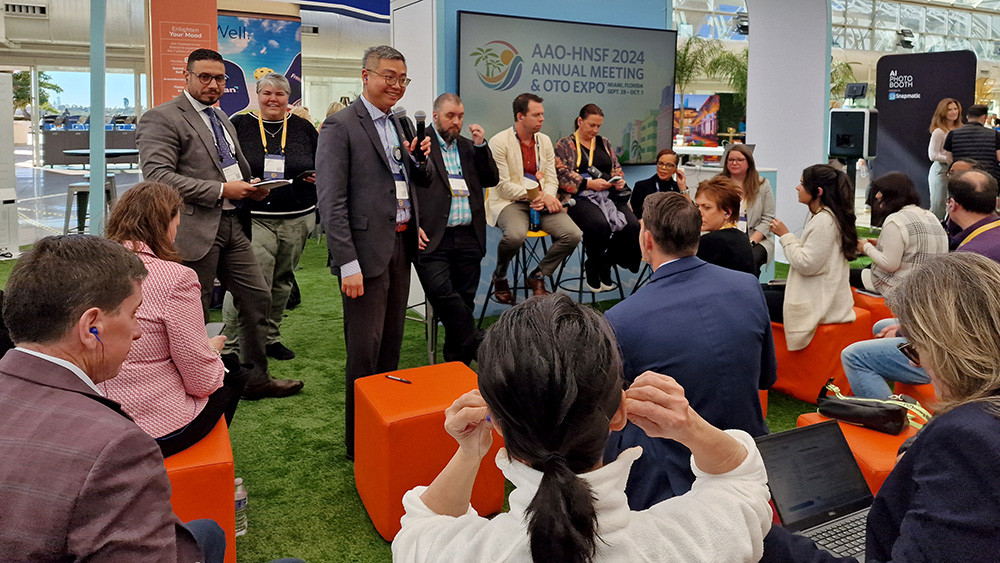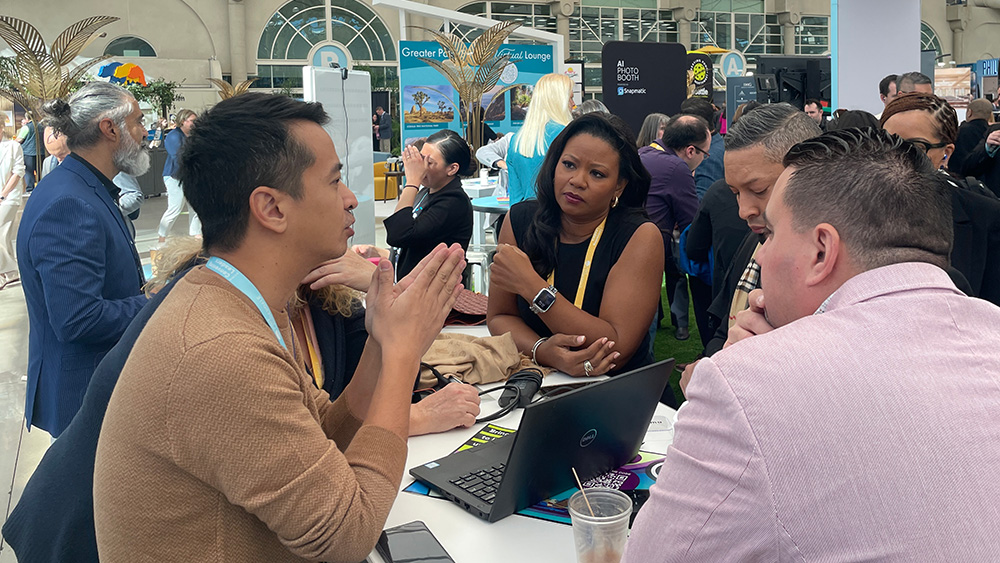
Moderator Shawn Cheng (with microphone) listens as a participant presents one team’s solution for the “Human Heroes vs. AI Wizards” challenge at CL24.
Last year, I started experimenting with the generative AI tool ChatGPT and making it part of my work, because of its promise to enhance productivity — but also for job security. It has become increasingly clear that — as several speakers at Convening Leaders 2024 in January in San Diego pointed out — we likely won’t lose our jobs to AI but to workers proficient in using AI.
I was therefore excited to participate in the Convening Leaders competition pitting humans against humans using gen AI. The session, “The Human Heroes vs. AI Wizards: The Ultimate #EventProfs Battle for Excellence,” part of the Tech Playground, promised to answer the question: Are meeting professionals — and their events — better off using gen AI?
Anh Nguyen, founder of Spark Event Management, and Shawn Cheng, event strategist at Curious Bear Management, organized the showdown, which was framed as a chance to determine whether AI is about to revolutionize the way we design events — or if we’re just not there yet.
Nguyen and Cheng, who also moderated the session, invited participants to split into teams of four to five people each and to choose which side they wanted to be on — a team supported by Gevme’s Spark AI, a gen AI tool developed in collaboration with PCMA, or a “purely human” team who wouldn’t use technology. Everyone eagerly rushed to the +AI side, so when the moderators asked for a few people to volunteer for the human-only team, I raised my hand. The competition ended up being one human team against a total of four teams that were supported by Spark AI.
The challenge before all five teams: to come up with an innovative marketing campaign for the upcoming American Academy of Otolaryngology-Head and Neck Surgery (AAO-HNSF) 2024 Annual Meeting & OTO EXPOSM in Miami, Florida.
Each team had to present their ideas to panelists Beth Burchill, CMP, senior director of meetings and corporate development at AAO; Carol Motley, SVP of convening sales and services at Greater Miami Convention & Visitors Bureau; Nick Borelli, AI course instructor at PCMA’s Event Leadership Institute; Paul Klopfer, cofounder of Reposite, an AI-powered marketplace connecting event planners and suppliers; and Ksenija Polla, CMP, ICCA’s head of education and legacy programs. Everyone was given background information on the event and documents that included its list of exhibitors, sponsor prospectus, registration rates, registration highlights from 2023, and overall evaluation from the previous event.

One of the teams discusses ideas for the challenge to create an innovative marketing campaign for an upcoming event.
‘We Are Too Smart for This’
Spoiler alert: The human team outperformed the four AI teams, delivering a suite of ideas that blended creativity with practicality — including scholarships and discounts, a creative spouse program, package deals for various attendee personas, program enhancements, exhibitor engagement, and a compelling visual and marketing slogan that seamlessly incorporated elements of the host destination. To pull that off, the human team used the opportunity to ask clarifying questions, which Nguyen noted is something that “a robot can’t do.”
“We are too smart for this,” said a participant on my (human-only) team. And it seemed that the +AI teams were in fact no match for our team’s creative spontaneity and intuition. While each +AI team produced detailed marketing plans, they lacked the human team’s innovative spin.
I think, however, it would be a mistake to conclude that this was a win for human ingenuity over machine learning. There was more at play here. It wasn’t that Spark isn’t capable of generating more or better ideas; the humans were hampered by their lack of experience using the tool. Because many on the +AI teams were using Spark AI for the first time, they had to begin by figuring out the tech, leaving less time to concentrate on the task at hand.
I couldn’t help but wonder whether there would have been a different outcome had the +AI teams had been more well-versed in the tech. Case in point: A recent paper published by researchers at The Wharton School and Cornell Tech shows that with minimal prompt engineering, AI produced higher-quality product ideas than elite university students.
“The real winners are all of us using all the tools,” Borelli said during the final judging, underscoring that the future of event planning isn’t choosing human creativity over AI efficiency. It’s leveraging the strengths of both in a collaborative way. For this to happen though, event planners need to first get comfortable with the idea of AI as their co-pilot and then keep experimenting.
I’m looking forward to a rematch.
Magdalina Atanassovais digital media editor of Convene.
